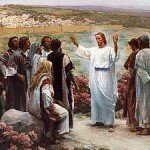The kingdom of heaven is like treasure hidden in a field, which a man found and covered up. Then in his joy he goes and sells all that he has and buys that field. “Again, the kingdom of heaven is like a merchant in search of fine pearls, who, on finding one pearl of great value, went and sold all that he had and bought it.
“Again, the kingdom of heaven is like a net that was thrown into the sea and gathered fish of every kind. When it was full, men drew it ashore and sat down and sorted the good into containers but threw away the bad. So it will be at the end of the age. The angels will come out and separate the evil from the righteous and throw them into the fiery furnace. In that place there will be weeping and gnashing of teeth. (Matthew 13:44-50)
As you read the passage above, what first comes to your mind? Do you see a common theme, a pattern? There is a phrase repeated multiple times – which cannot be ignored in honest, fair Bible study. If you noticed the importance placed on the “Kingdom of Heaven” (or the variation “Kingdom of God”), you are on the right track! Not only is this a powerful part this text, but is significant the book of Matthew overall, as it is stated 32 times in 28 chapters! Context is always an important component in any
form of communication. It can be a determining factor in situations between spouses, it can buffer arguments with children, and can make all the difference in the workplace. It is certainly no different with the word of God.
 As we first glance at these three parables, they may seem self explanatory enough – if we quickly read them in a small block – alone from the rest of the Bible, or even passages surrounding them. Most people with a background in any form of Bible study realize that parables are an earthly story with a heavenly meaning. We can easily walk away from these verses thinking we have fairly gleaned our scripture and satisfied our Bible study with a quick reading.
As we first glance at these three parables, they may seem self explanatory enough – if we quickly read them in a small block – alone from the rest of the Bible, or even passages surrounding them. Most people with a background in any form of Bible study realize that parables are an earthly story with a heavenly meaning. We can easily walk away from these verses thinking we have fairly gleaned our scripture and satisfied our Bible study with a quick reading.
However, upon stepping back and widening our focus, there is so much surrounding these scriptures, and even the book of Matthew, that will help us to have a deeper understanding and appreciation for what is being stated in these verses.
The book of Matthew was primarily directed at a Jewish audience. So, we have to remember that their idea of the word “Kingdom” was reasonably skewed. Jesus spent much of His time, as recorded in the book of Matthew, trying to develop an understanding of the spiritual as opposed to the physical. We must keep this in mind to understand the text!
“The story form concealed those truths from those who would abuse them, and thus seek the Savior’s death prematurely [Matt. 13:13ff] … Frequently, ‘kingdom’ simply denotes the church [Matt. 16:18-19; Col. 1:13; Rev. 1:6,9]. Clearly, it is this… sense to which the Lord alludes in the collection of ‘kingdom’ parables of Matthew 13. Jesus is thus teaching some great truths relative to the church which he would presently establish (Matt. 16:18)” (Wayne Jackson, Christian Courier). These parables are very “Kingdom” focused.
 In fact, in the closing of chapter 12 in Matthew, Jesus tells his audience that those who do the will of His Father in Heaven are His brother, mother, and sister—his family, His church, His Kingdom. He then goes in to the seven parables in chapter 13. It is imperative to realize what He is teaching as He starts with the parable of the sower which ultimately reveals how to belong to His Kingdom. He then relays of the parables of the mustard seed and leaven which show how to thrive in the kingdom. He then explains the parable of the weeds, which explains the consequences for not being in His kingdom. This is all important to comprehend as we come to our text.
In fact, in the closing of chapter 12 in Matthew, Jesus tells his audience that those who do the will of His Father in Heaven are His brother, mother, and sister—his family, His church, His Kingdom. He then goes in to the seven parables in chapter 13. It is imperative to realize what He is teaching as He starts with the parable of the sower which ultimately reveals how to belong to His Kingdom. He then relays of the parables of the mustard seed and leaven which show how to thrive in the kingdom. He then explains the parable of the weeds, which explains the consequences for not being in His kingdom. This is all important to comprehend as we come to our text.
In the parable of the hidden treasure, the pearl, and the net, we are educated and reminded. In the parable of the hidden treasure and pearl, there is an obvious difference. One man stumbled upon his treasure, while the other was in search of it. Looking at this through modern glasses, one may relate, or know of someone, who fits both categories. There are those like the man who found the hidden treasure in the field- they are going about their earthly lives, not even searching for the gospel, the word of God, when it may come to them in the form of a caring neighbor, a co-worker, or friend—a treasure they never even realized existed! At the point in which they receive the good news, the treasure, their lives are transformed, and they “sell” their former life to commit to their new life through Christ, in His Kingdom! There are also those who are like the man who was in search of fine pearls-they may go from congregation to congregation, denomination to non-denomination, seeking the Truth found in His word. After they find it – they also “sell” the things of their old life and hold on to this new life of great worth!
Key Points
 The overlying message from the hidden treasure and pearl is that they both found something of great value, which was a blessing! It is a simple, yet very powerful lesson taught! The “kingdom,” which is referred to here, as in so many places among our surrounding text, is worth something of great value! What a strong message! How very necessary for those in modern times to understand, as well! We need this valuable entity if we belong to Christ!
The overlying message from the hidden treasure and pearl is that they both found something of great value, which was a blessing! It is a simple, yet very powerful lesson taught! The “kingdom,” which is referred to here, as in so many places among our surrounding text, is worth something of great value! What a strong message! How very necessary for those in modern times to understand, as well! We need this valuable entity if we belong to Christ!
In the parable of the net, we are reminded, as in earlier verses in Matthew chapter 13 concerning the parable of the weeds, of the dire consequences of not being apart of the Kingdom of Heaven, that is, Christ’s Church, His people who have obeyed and belong to His church!
By Erin Wells
Erin is a make-a-home-mom who resides in the Jacksonville, FL area where her husband, Joe, is a pulpit minister. She enjoys traveling the country with their 4 children while Joe conducts seminars on family and culture. She loves spending time with friends and family, scrapbooking, writing, homeschooling their children, and is the secretary of Kaio Publications, a non-profit organization which produces material for families, including the christian teenage electronic magazine, iLuminate.
 Welcome! We are so glad you stopped by. Come Fill Your Cup is a group of Christian ladies dedicated to equipping women for study and service. We know you are busy and that life’s hectic pace pulls you in so many directions, but you can’t truly be the woman God desires unless you take time to fill your own cup…not with spa days (though we love a good spa!) or the latest novel…but with God’s Holy Word. We want to help you with that! Our goal is to reach you in the midst of your busy day and give you encouragement, education, and fellowship as you strive to live the life God has laid before you. Our prayer is that we can help fill your cup so that you, in turn, can overflow to all those around you. So, as we like to say…come fill your cup, and let it overflow!
Welcome! We are so glad you stopped by. Come Fill Your Cup is a group of Christian ladies dedicated to equipping women for study and service. We know you are busy and that life’s hectic pace pulls you in so many directions, but you can’t truly be the woman God desires unless you take time to fill your own cup…not with spa days (though we love a good spa!) or the latest novel…but with God’s Holy Word. We want to help you with that! Our goal is to reach you in the midst of your busy day and give you encouragement, education, and fellowship as you strive to live the life God has laid before you. Our prayer is that we can help fill your cup so that you, in turn, can overflow to all those around you. So, as we like to say…come fill your cup, and let it overflow!
Thank you! This is how I understand these parables as well.